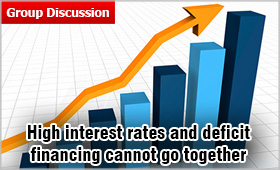
Economy of a country is controlled by the Government as well as the Central Bank of the country. Both have to formulate the policy which should be complimentary to each other.
There has been a large scale criticism in Indian context in regard to the coordination of these policies formulated by the Government of India and the Reserve Bank of India. The lack of coordination issue has remained a hot discussion topic. Since the topic is more related to management of economic system, many B schools have included it in their GD round
Important fact
Ideally a country’s economy is controlled by two types of economic measures by the policy makers – Fiscal and Monetary. While Fiscal policy is framed and implemented by the government with regulation of its spending and collection of revenue, the Monetary policy is controlled by the Central Bank of the country. In India it is The Reserve Bank of India.
Deficit Financing by Government-measure to increase money
- These policies may be designed and implemented for the expansion or contraction of the economy.
- Policy measures aimed to increase GDP and economic growth are called expansionary. The measures taken to check the inflationary trends in the economy are the contractionary measures.
- Conceptually, when demand is low in the economy, the government can step in and increase its spending to stimulate demand. It may also lower taxes to increase disposable income for people and corporations in the economy. It is the manipulation of the level of aggregate demand in the economy to achieve economic objectives of price stability, full employment, and economic growth.
- Unsustainable fiscal deficits and public debt levels create the spectre of fiscal dominance, leading to high and volatile inflation and elevated risk on government debt. If the Fiscal Authority i.e. the Government during the period of inflationary trends brings out more budgetary deficits, resorts to fortune of subsidies, more public spending and more public debt, resorts to hefty deficit financing, it increases money supply in the economy and assists in increasing the rate of inflation instead of checking it.
Interest rates, Reserve Ratio to be controlled by RBI
- An unfavourable exchange rate dynamic – linked to weak fiscal and monetary policy credibility is the key factor in the destabilized capital outflows.
- Accordingly Monetary policy is formulated to control the supply of money, by adopting different Quantitative or qualitative measures like bringing suitable changes to Bank rate policy often targeting correction in rate of interest, Cash Reserve Ratio and Statutory Liquidity Ratio to leave more /less disposable funds with financial institutions to influence outcomes like economic growth, inflation, exchange rates with other currencies and unemployment.
- Reserve Bank of India, the Monetary Authority, in order to curtail money supply resorts to quantitative control measures like higher bank rate policy and higher CRR & SLR.
- But Deficit financing nullifies the contractionary effect of monetary policy with the implementation of expansionary fiscal policy.
- In India Fiscal policy is more oriented to achieve the political gains than the economic ones. Almost in every budget the fiscal deficit target is pegged at 5 to 5.5 per cent of the GDP, but the government find it difficult to stick to the Budget estimates mainly because both the policies are not supportive to each other.
India needs primary surplus
Indian economy that is on its path of growth requires Monetary and Fiscal policies following each other in right perspective. RBI Dy. Governor H.R. Khan was of the view "As we have articulated time and again, it (monetary policy) has to be in tandem with the fiscal policy. It has to be a joint venture. It is not a solo play," It is important to focus on the primary deficit. The indicator of understanding where we stand is the primary deficit, deficit net of interest payments. Under normal circumstances, a country should always run primary surpluses.
In 1999, India had Kargil war, one or two years of primary deficit might be understood. In 2008-09, there was a global crisis; one year of primary deficit would be enough to recover out of it. But in every normal year, we should be running primary surpluses.
The Fiscal and Monetary policy therefore, have to be framed and implemented coherently to attain a set of objectives, oriented towards the growth and stability of the economy. However, in India for the past two decades, the mismatch between the fiscal and monetary policies has remained a major concern in the emerging market economy.
When there is deficit financing, the high bank deposit and advance rates attract the customers to keep their deposits in banks and due to high rates of loans fewer borrowers turn up for loan. Whatever impact the fiscal policy wanted to create, is defeated by Monetary policy.
However, the Government has now taken some bold steps like doing away with subsidies, FDI in retail, and it appears that the country is coming out of current account deficit and the balance of payments is moving into surplus territory, appreciation in the rupee is expected, money markets are expected to react positively to it with the greater confidence of foreign investors. To support these growth prospects a well designed monetary policy is required.
After the demonetization 2016, the need is to restore the growth rate which has started falling down to around 6% from 7%. To achieve the goal both fiscal and monetary policies need to make available more loanable funds at low interest rate...























